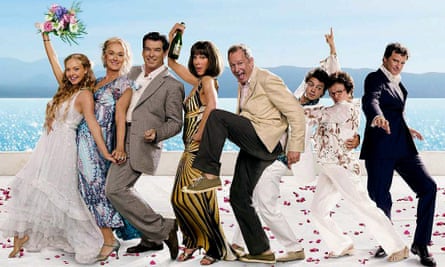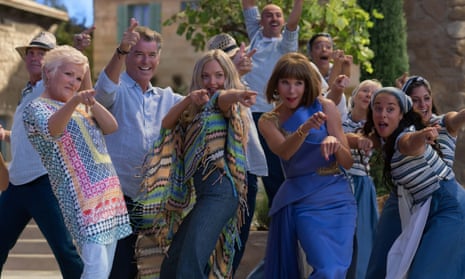If anyone has due cause to hate the first Mamma Mia film, I am confident it is me. I worked at a cinema in Cornwall when the Scandi scud hit screens in summer 2008. If routinely watching it up to four times a day wasn’t punishment enough, the sadistic manager forced his teenage staff to clap and dance before the audience as the cast’s dance party rolled over the credits. We buried our faces in our swampy sleeves, the purpose of our oversized uniforms finally clear.
The film played every day from 10 July until it came out on DVD in late November. That didn’t deter the legions of Streep-seekers who were furious we were no longer showing it. I tried to tell them they could buy it from HMV around the corner, take it home and watch it to their hearts’ content. My suggestion fell on ears deaf to anything but the sound of Pierce Brosnan reprising SOS in the style of Scott Walker’s The Drift.
I resented this film, and Abba, with every fibre of my 19-year-old being, and relished the critical savaging that legitimised my pain. It was probably my first taste of the classic Peter Bradshaw 1/5 review: “No film has ever had a more irrelevant story,” he wrote. “This soulless panto has done nothing to earn or even understand the good feeling.” I agreed, but felt Peter could never truly know “soulless panto” until he had resentfully line-danced in front of 260 middle-aged women.
So I was surprised last year when I got the urge to watch it again. My positions on Abba, high camp and lowbrow fun had softened, almost a decade since my deathly serious teens (thank god). I watched it with my grandmother, a seasoned watcher (Amazon creepily reminds me that I pre-ordered the DVD for her), and my boyfriend, a virgin viewer who shot me looks throughout the film suggesting he was ready to embark on The Visitors era of our relationship. I loved it. Where I had previously seen secondhand embarrassment, I now saw a strangely radical film about randy middle-aged women getting their kicks without any comeuppance – not exactly a common sight – set to some of the best pop songs ever written.
What has surprised me even more than my newfound love of the original is the massive critical about-turn for Mamma Mia 2: Here We Go Again. The original is rated 54% fresh on reviews aggregator Rotten Tomatoes. Although it is early days for HWGA, it currently stands at 84% fresh. It even made Peter “smile in spite of myself” in his 3/5 review, and praise its “zany surreality”. Mark Kermode’s BBC Radio 5Live review of the original went viral for his stunned apoplexy at how such a categorically terrible film could make him cry, but going by his tweets this week (“Currently writing my @ObsNewReview of Mamma Mia: Here We Go Again, and I just keep bursting into tears”) it sounds like he is welcoming the weepiness with both (jazz) hands this time.
For what it’s worth, I don’t think HWGA is a better film, much as I cried twice and fell even more in love with Christine Baranski. I don’t think it is the film’s quality that has led to a markedly more positive critical response; instead, a collective shift in cultural values. I’m far from the only reformed Abba fan: there are Abba club nights, there is an exhibition narrated by Jarvis Cocker. Pitchfork critic Jazz Monroe recently wrote about how accepting his love for them had ramifications beyond his record collection: “In adulthood, the only way to reassess Abba is by a kind of reinvention, to reckon with yourself in such a way that other previously held beliefs become suspect, too.”

Warming towards Abba reflects a critical embrace of pop culture over the last decade. “Poptimism” has meant that art that was once dismissed for being lightweight, feminine and glittery is now subject to critical close-readings that combine academia with fannish enthusiasm (which can, it’s worth saying, sometimes prompt as much eye-rolling as the close-minded stuff). These days there is no more suspicious critical quality than snobbery – dismissing lowbrow culture for being lowbrow is seen as gauche at best, actively prejudiced (when its primary fanbase is women, teenage girls and LGBTQ people) at worst. So we have Entertainment Weekly noting HWGA’s rarity among supposedly mass-audience summer blockbusters, which are seldom aimed at women, while Variety recognised it as “a love poem to the primal bond of mothers and daughters”.
The last big cinema hit of this ilk was The Greatest Showman, released in late 2017, which took £48m and only left the UK’s top 10 when it came out on DVD in April 2018. You only need to look at the soundtrack to see how popular it remains: it has spent 21 of its 29 weeks on the album chart at No 1. Yet on Rotten Tomatoes, the film is certified 56% fresh. “Very poor, very, very poor,” said Kermode, who eventually saw the film a second time after lobbying from listeners.
As well as conceding his now infamous argument that it didn’t contain “a single memorable tune”, Kermode alighted on a wider disconnect between critics and viewers. Seeing it at a private press screening made the film seem awful. But watching it with an audience (coincidentally, at the very cinema that inflicted my Mamma Mia humiliation) proved revelatory: “So warm, so encouraging, so uplifting, it made it seem like a different film.” Perhaps the affection for HWGA indicates critics wanting to avoid another total misreading of the popular mood. “You have to embrace the communal spirit,” Kermode concluded.
And this may well be the reason for HWGA’s critical success: communal spirit is in pretty short supply in 2018. “The world is a mess these days,” wrote the Seattle Times’s Moira Macdonald. “Some of us might just need this movie.” Perhaps that’s why critics are laughing with it, not at it. “There aren’t many lightweight, feelgood romantic comedies around these days,” the BBC said. “So [director Ol] Parker deserves credit for whipping up such a fluffy cloud of cinematic candy floss.”
It’s an odd moment of critical unity from which, at least if you live by Kalokairi rules, impromptu Abba singalongs are born: This is critics’ Waterloo: “Knowing my fate is to be with you …” And for today’s 19-year-olds being forced to mug in front of an audience for minimum wage, I leave you in the Washington Post’s capable if calloused hands: “Yes, you can dance. Yes, you can even jive. Yes, you can be having the time of your life. Just not here.”

